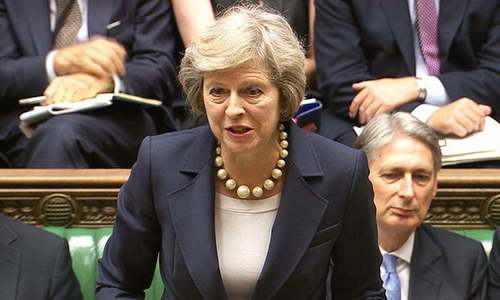Moscow charged on Wednesday that Britain either failed to protect a Russian national from what it termed a “terrorist attack” or was itself behind the poisoning of a former double agent in England.
The attempted murder of ex-spy Sergei Skripal and his daughter Yulia in the city of Salisbury this month has plunged Russia's ties with Britain and its allies into a new crisis.
The deepening row has seen Britain throw out 23 Russian diplomats, prompting a tit-for-tat response from Moscow.
British Foreign Secretary Borish Johnson said on Wednesday that Russia had wanted to send “a sign” with the nerve agent attack on Skripal to warn defectors that they cannot escape Moscow's power.
A senior Russian diplomat used blunt language to mock London for its “island mentality” and using “terminology from British TV shows”, in a briefing to representatives of foreign missions that was broadcast live in a rare move.
“The British authorities are either unable to ensure protection from such a... terrorist attack on its territory, or they directly or indirectly ─ I am not accusing anyone of anything here ─ directed the attack on a Russian national,” said Vladimir Yermakov, head of the foreign ministry's non-proliferation and arms control department.
“There's no third option here,” he said during the two-hour meeting, which also included representatives of the defence and other ministries.
'Ashamed for you'
The diplomat ─ who alternated between tough talk and quips ─ criticised Britain's “Russophobia” and mocked Britain for insisting Skripal was attacked with a Soviet-designed nerve attack.
“Pull yourselves away a little bit from your Russophobia, your island mentality,” Yermakov said in response to a question from a British official. “I am ashamed for you.” “We don't understand what's going on inside their heads.”
He rejected claims the chemical weapon was used in the attack, saying it would have killed people on the spot and suggested that Washington might have also had a hand in it.
“One can also imagine that this might have been directed from across the ocean,” he said. “Britain's closest partner remains the only state which officially maintains the world's largest arsenal of chemical weapons.”
Igor Kirillov, commander of Russia's radiation, chemical and biological protection troops, said he had never heard of the nerve agent Britain described.
President Vladimir Putin has dismissed allegations of Moscow's responsibility as “nonsense”.
Explore: Putin — villain abroad, hero at home
The British embassy said on Twitter Russia had failed to provide answers and continued “to spread lies & disinformation.”
'Calling out' Moscow abuses
In an appearance before a committee of MPs in London, Johnson said Russia chose to send a message to potential defectors by targeting Skripal because of London's record of “calling out” Moscow's abuses.
“I think the reason that they picked the United Kingdom is very simple, it's because this is a country that does have that particular set of values, it does believe in freedom, and in democracy and in the rule of law, and has time and again called out Russia over its abuses of those values.”
He also said he was seeking guarantees from Russia that England fans visiting the football World Cup in June and July would be safe.
Heads of several Western diplomatic missions including British and US ambassadors snubbed the Moscow briefing, which the Kremlin said showed London's unwillingness to cooperate.
“Perhaps this is another eloquent demonstration of the absurdity of the situation when questions are being asked but the unwillingness to hear some answers is being shown,” Putin's spokesman Dmitry Peskov said.
Foreign Minister Sergei Lavrov urged the British government to “respond calmly” to the attack on the Skripals, who remain in critical condition.
“If the British government continues taking some anti-Russian measures, we will hit back under the principle of reciprocity,” he said in Japan.
“Overall, there is no doubt that the British leadership has knowingly chosen to undermine the British-Russian relationship.” Britain says only Russia had the capability, motive, and intent to be behind the attack.
The EU has expressed its solidarity with Britain and at a summit later this week, its leaders will agree to “coordinate on the consequences” for Russia, according to a draft statement seen by AFP.
However, US President Donald Trump on Tuesday appeared to have ignored the poisoning row when he called to congratulate Putin on his re-election and proposed a summit in the “not-too-distant future”.
Although the nerve attack has topped global headlines for weeks, it did not come up during the leaders' conversation, according to both the Kremlin and White House.














































